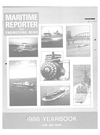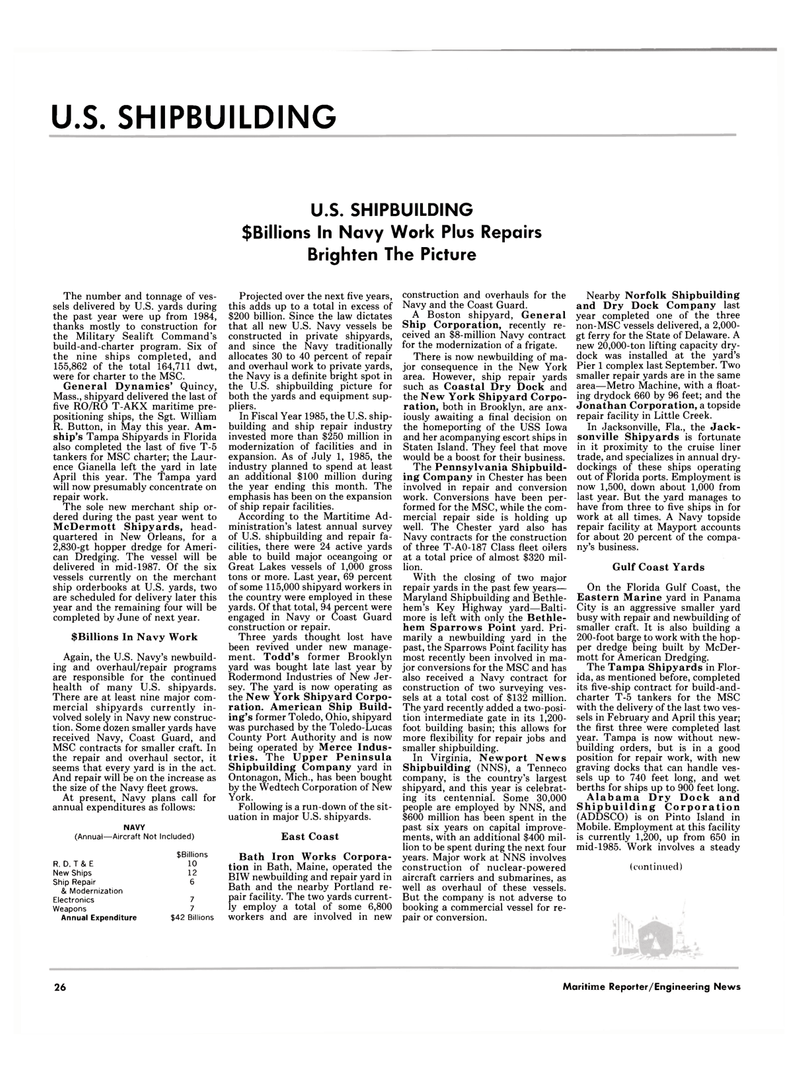
Page 26: of Maritime Reporter Magazine (June 1986)
Read this page in Pdf, Flash or Html5 edition of June 1986 Maritime Reporter Magazine
U.S. SHIPBUILDING
U.S. SHIPBUILDING $Billions In Navy Work Plus Repairs
Brighten The Picture
The number and tonnage of ves- sels delivered by U.S. yards during the past year were up from 1984, thanks mostly to construction for the Military Sealift Command's build-and-charter program. Six of the nine ships completed, and 155,862 of the total 164,711 dwt, were for charter to the MSC.
General Dynamics' Quincy,
Mass., shipyard delivered the last of five RO/RO T-AKX maritime ^re- positioning ships, the Sgt. William
R. Button, in May this year. Am- ship's Tampa Shipyards in Florida also completed the last of five T-5 tankers for MSC charter; the Laur- ence Gianella left the yard in late
April this year. The Tampa yard will now presumably concentrate on repair work.
The sole new merchant ship or- dered during the past year went to
McDermott Shipyards, head- quartered in New Orleans, for a 2,830-gt hopper dredge for Ameri- can Dredging. The vessel will be delivered in mid-1987. Of the six vessels currently on the merchant ship orderbooks at U.S. yards, two are scheduled for delivery later this year and the remaining four will be completed by June of next year. $Billions In Navy Work
Again, the U.S. Navy's newbuild- ing and overhaul/repair programs are responsible for the continued health of many U.S. shipyards.
There are at least nine major com- mercial shipyards currently in- volved solely in Navy new construc- tion. Some dozen smaller yards have received Navy, Coast Guard, and
MSC contracts for smaller craft. In the repair and overhaul sector, it seems that every yard is in the act.
And repair will be on the increase as the size of the Navy fleet grows.
At present, Navy plans call for annual expenditures as follows:
NAVY (Annual—Aircraft Not Included)
R, D, T & E
New Ships
Ship Repair & Modernization
Electronics
Weapons
Annual Expenditure $Billions 10 12 6 7 7 $42 Billions
Projected over the next five years, this adds up to a total in excess of $200 billion. Since the law dictates that all new U.S. Navy vessels be constructed in private shipyards, and since the Navy traditionally allocates 30 to 40 percent of repair and overhaul work to private yards, the Navy is a definite bright spot in the U.S. shipbuilding picture for both the yards and equipment sup- pliers.
In Fiscal Year 1985, the U.S. ship- building and ship repair industry invested more than $250 million in modernization of facilities and in expansion. As of July 1, 1985, the industry planned to spend at least an additional $100 million during the year ending this month. The emphasis has been on the expansion of ship repair facilities.
According to the Martitime Ad- ministration's latest annual survey of U.S. shipbuilding and repair fa- cilities, there were 24 active yards able to build major oceangoing or
Great Lakes vessels of 1,000 gross tons or more. Last year, 69 percent of some 115,000 shipyard workers in the country were employed in these yards. Of that total, 94 percent were engaged in Navy or Coast Guard construction or repair.
Three yards thought lost have been revived under new manage- ment. Todd's former Brooklyn yard was bought late last year by
Rodermond Industries of New Jer- sey. The yard is now operating as the New York Shipyard Corpo- ration. American Ship Build- ing's former Toledo, Ohio, shipyard was purchased by the Toledo-Lucas
County Port Authority and is now being operated by Merce Indus- tries. The Upper Peninsula
Shipbuilding Company yard in
Ontonagon, Mich., has been bought by the Wedtech Corporation of New
York.
Following is a run-down of the sit- uation in major U.S. shipyards.
East Coast
Bath Iron Works Corpora- tion in Bath, Maine, operated the
BIW newbuilding and repair yard in
Bath and the nearby Portland re- pair facility. The two yards current- ly employ a total of some 6,800 workers and are involved in new construction and overhauls for the
Navy and the Coast Guard.
A Boston shipyard, General
Ship Corporation, recently re- ceived an $8-million Navy contract for the modernization of a frigate.
There is now newbuilding of ma- jor consequence in the New York area. However, ship repair yards such as Coastal Dry Dock and the New York Shipyard Corpo- ration, both in Brooklyn, are anx- iously awaiting a final decision on the homeporting of the USS Iowa and her acompanying escort ships in
Staten Island. They feel that move would be a boost for their business.
The Pennsylvania Shipbuild- ing Company in Chester has been involved in repair and conversion work. Conversions have been per- formed for the MSC, while the com- mercial repair side is holding up well. The Chester yard also has
Navy contracts for the construction of three T-AO-187 Class fleet oilers at a total price of almost $320 mil- lion.
With the closing of two major repair yards in the past few years—
Maryland Shipbuilding and Bethle- hem's Key Highway yard—Balti- more is left with only the Bethle- hem Sparrows Point yard. Pri- marily a newbuilding yard in the past, the Sparrows Point facility has most recently been involved in ma- jor conversions for the MSC and has also received a Navy contract for construction of two surveying ves- sels at a total cost of $132 million.
The yard recently added a two-posi- tion intermediate gate in its 1,200- foot building basin; this allows for more flexibility for repair jobs and smaller shipbuilding.
In Virginia, Newport News
Shipbuilding (NNS), a Tenneco company, is the country's largest shipyard, and this year is celebrat- ing its centennial. Some 30,000 people are employed by NNS, and $600 million has been spent in the past six years on capital improve- ments, with an additional $400 mil- lion to be spent during the next four years. Major work at NNS involves construction of nuclear-powered aircraft carriers and submarines, as well as overhaul of these vessels.
But the company is not adverse to booking a commercial vessel for re- pair or conversion.
Nearby Norfolk Shipbuilding and Dry Dock Company last year completed one of the three non-MSC vessels delivered, a 2,000- gt ferry for the State of Delaware. A new 20,000-ton lifting capacity dry- dock was installed at the yard's
Pier 1 complex last September. Two smaller repair yards are in the same area—Metro Machine, with a float- ing drydock 660 by 96 feet; and the
Jonathan Corporation, a topside repair facility in Little Creek.
In Jacksonville, Fla., the Jack- sonville Shipyards is fortunate in it proximity to the cruise liner trade, and specializes in annual dry- dockings of these ships operating out of Florida ports. Employment is now 1,500, down about 1,000 from last year. But the yard manages to have from three to five ships in for work at all times. A Navy topside repair facility at Mayport accounts for about 20 percent of the compa- ny's business.
Gulf Coast Yards
On the Florida Gulf Coast, the
Eastern Marine yard in Panama
City is an aggressive smaller yard busy with repair and newbuilding of smaller craft. It is also building a 200-foot barge to work with the hop- per dredge being built by McDer- mott for American Dredging.
The Tampa Shipyards in Flor- ida, as mentioned before, completed its five-ship contract for build-and- charter T-5 tankers for the MSC with the delivery of the last two ves- sels in February and April this year; the first three were completed last year. Tampa is now without new- building orders, but is in a good position for repair work, with new graving docks that can handle ves- sels up to 740 feet long, and wet berths for ships up to 900 feet long.
Alabama Dry Dock and
Shipbuilding Corporation (ADDSCO) is on Pinto Island in
Mobile. Employment at this facility is currently 1,200, up from 650 in mid-1985. Work involves a steady (continued) 1 26 Maritime Reporter/Engineering News

 25
25

 27
27
